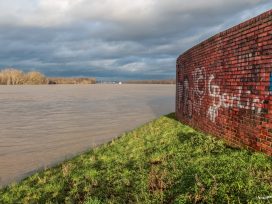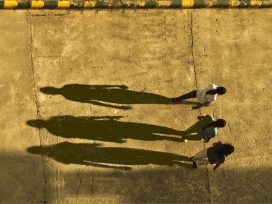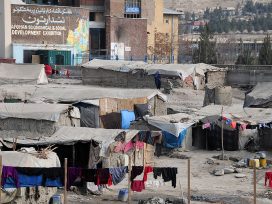It is this that Lucy Popescu’s anthology A Country of Refuge sets out to address. She says that her book is ‘intended to directly challenge the negative press given to those seeking a safe haven on these shores as well as serving as a testament to the strength of the human spirit’. She succeeds magnificently with a collection of fiction, memoirs, poetry and essays, plus a stirring lecture from A L Kennedy in the forthright style we have come to expect from her. It is a moving, poignant, sometimes painful but always enlightening book. A Country of Refuge explores Britain’s history as a place of refuge ‘for those fleeing conflict, poverty or terror’ and the varieties of experience such people have encountered on arrival over centuries.
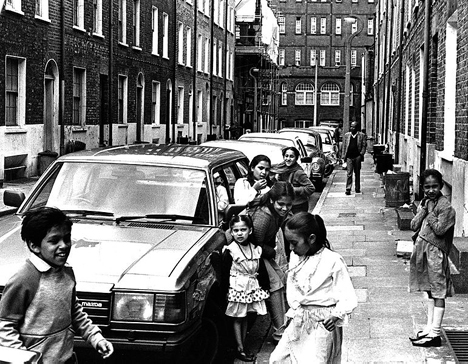
Parfett Street, Whitechapel E1,London, 1986. Photo: al cane. Source:Wikimedia
The voyage starts with Sebastian Barry’s ‘Journal’, set in 19th-century Ireland in the wake of the famine that saw up to a quarter of the population flee to Britain and North America, and concludes in the Calais ‘jungle’ in 2015 with an enigmatic tale by Roma Tearne. The fourteen million people who found themselves refugees at the end of the Second World War are mentioned by Joan Smith in an essay that draws disturbing parallels between the fate of Anne Frank and her family in the 1940s and that of the three-year-old Syrian boy Aylan Kurdi, a chance photo of whose dead body lying on the shore after the people-smuggler’s rubber dinghy in which he was travelling capsized, briefly roused sympathy for today’s ‘migrants’. ‘Aylan Kurdi did not need to die, any more than Anne Frank … The closing of borders to refugees from Nazi Germany is mirrored in the twenty-first century by legal obstacles which force desperate people into the hands of criminal gangs.’
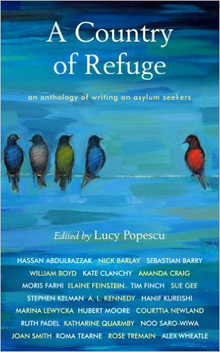 Popescu’s collection is so rich and wide-ranging that it is difficult to single out individual contributions. Marina Lewycka’s ‘A Hard-Luck Story’, set in a detention centre for asylum seekers, tells an all-too-common story with the wit and irony that characterise her work. Moris Farhi offers a strangely moving story that seems to say there are some who will never find refuge in this world, only outside it. Hassan Abdulrazzak’s account of his family’s flight from Saddam Hussein’s Iraq, told from his parents’ safe haven in New Malden, is alive with humour and gratitude. I cannot help mentioning, in the year of its sixtieth anniversary, an event within my personal memory: the Hungarian Revolution of 1956 and its brutal suppression by the USSR, as a result of which an estimated 200,000 fled. They included Nick Barlay’s parents, who eventually came to call their ‘accidental country’ home. His account of their experiences highlights the happenstance of all refugee journeys. Some of Popescu’s contributors are themselves refugees or migrants, including Alex Wheatle, who writes about the Jamaican immigrants invited to Britain in the 1950s, and Hanif Kureishi, whose picture of the immigrant as alien, a ‘threatening other … a source of contagion and horror’, appears to have returned to haunt us.
Popescu’s collection is so rich and wide-ranging that it is difficult to single out individual contributions. Marina Lewycka’s ‘A Hard-Luck Story’, set in a detention centre for asylum seekers, tells an all-too-common story with the wit and irony that characterise her work. Moris Farhi offers a strangely moving story that seems to say there are some who will never find refuge in this world, only outside it. Hassan Abdulrazzak’s account of his family’s flight from Saddam Hussein’s Iraq, told from his parents’ safe haven in New Malden, is alive with humour and gratitude. I cannot help mentioning, in the year of its sixtieth anniversary, an event within my personal memory: the Hungarian Revolution of 1956 and its brutal suppression by the USSR, as a result of which an estimated 200,000 fled. They included Nick Barlay’s parents, who eventually came to call their ‘accidental country’ home. His account of their experiences highlights the happenstance of all refugee journeys. Some of Popescu’s contributors are themselves refugees or migrants, including Alex Wheatle, who writes about the Jamaican immigrants invited to Britain in the 1950s, and Hanif Kureishi, whose picture of the immigrant as alien, a ‘threatening other … a source of contagion and horror’, appears to have returned to haunt us.
The term ‘refugee’ came into common usage in the late17th century to describe the French Huguenots who came to Protestant England to escape persecution after the revocation of the Edict of Nantes, possibly the largest refugee influx welcomed into Britain until modern times. It is this tradition of hospitality that Popescu reminds us of and hopes we can recover.
I wish I could share her optimism, but the tradition has worn thin: the world today is a very different place. The welcomes given to refugees from Nazi Germany, Hungarians fleeing the Soviets and the 17th-century refugees from Catholic France were all about ‘my enemy’s enemy’ and the strategic, even moral, necessity of treating them as ‘friends’. The millions now pouring out of Iraq, Syria, Afghanistan and Libya present a different problem for Britain and the West: who now is the enemy?
A Country of Refuge – an excellent read, even if refugees and migration are not top of your concerns – makes this dilemma all too clear. The eyewitness gives way to the long view, probably essential if we are to be shamed or persuaded into challenging present attitudes and, in Popescu’s words, fostering ‘a kinder attitude towards our fellow humans’.
A Country of Refuge
An Anthology of Writing on Asylum Seekers
Edited by Lucy Popescu
(Unbound, 2016)


 Popescu’s collection is so rich and wide-ranging that it is difficult to single out individual contributions. Marina Lewycka’s ‘A Hard-Luck Story’, set in a detention centre for asylum seekers, tells an all-too-common story with the wit and irony that characterise her work. Moris Farhi offers a strangely moving story that seems to say there are some who will never find refuge in this world, only outside it. Hassan Abdulrazzak’s account of his family’s flight from Saddam Hussein’s Iraq, told from his parents’ safe haven in New Malden, is alive with humour and gratitude. I cannot help mentioning, in the year of its sixtieth anniversary, an event within my personal memory: the Hungarian Revolution of 1956 and its brutal suppression by the USSR, as a result of which an estimated 200,000 fled. They included Nick Barlay’s parents, who eventually came to call their ‘accidental country’ home. His account of their experiences highlights the happenstance of all refugee journeys. Some of Popescu’s contributors are themselves refugees or migrants, including Alex Wheatle, who writes about the Jamaican immigrants invited to Britain in the 1950s, and Hanif Kureishi, whose picture of the immigrant as alien, a ‘threatening other … a source of contagion and horror’, appears to have returned to haunt us.
Popescu’s collection is so rich and wide-ranging that it is difficult to single out individual contributions. Marina Lewycka’s ‘A Hard-Luck Story’, set in a detention centre for asylum seekers, tells an all-too-common story with the wit and irony that characterise her work. Moris Farhi offers a strangely moving story that seems to say there are some who will never find refuge in this world, only outside it. Hassan Abdulrazzak’s account of his family’s flight from Saddam Hussein’s Iraq, told from his parents’ safe haven in New Malden, is alive with humour and gratitude. I cannot help mentioning, in the year of its sixtieth anniversary, an event within my personal memory: the Hungarian Revolution of 1956 and its brutal suppression by the USSR, as a result of which an estimated 200,000 fled. They included Nick Barlay’s parents, who eventually came to call their ‘accidental country’ home. His account of their experiences highlights the happenstance of all refugee journeys. Some of Popescu’s contributors are themselves refugees or migrants, including Alex Wheatle, who writes about the Jamaican immigrants invited to Britain in the 1950s, and Hanif Kureishi, whose picture of the immigrant as alien, a ‘threatening other … a source of contagion and horror’, appears to have returned to haunt us.

